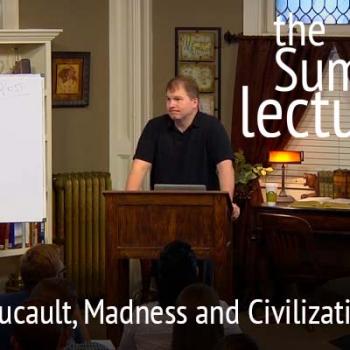
What I mean is that ideas that have consequences very often come to us in the context of a narrative. At Summit, we teach that there are really six big stories of the world that are fighting for your attention. Robert Webber says that this is
“The most pressing spiritual issue of our time: who gets to narrate (tell the story of) the world?”
There are six stories right now vying to tell the story of the world.
The first one is Secular Humanism. Secular Humanism dominates Western Civilization. It is the story of the world that dominates how we understand law, education, politics, and even family. It’s been enormously important. But the story that Secular Humanism most often collides with is the Christian story.
Western Civilization was built on the Christian story and the Christian conception of reality: that the world we live in has a design, that people are actually valuable and are made in the image and likeness of God. Christianity built Western Civilization while Secular Humanism is taking over Western Civilization. That’s where this conflict comes from.
By the way, you may have heard that Christianity was the worst thing that ever happened to the world. The truth is that Christianity is the reason we have Western Civilization. It’s the reason we have science, hospitals, charity and all that sort of thing. You should check out Rodney Stark’s The Victory of Reason. Another great book is Dinesh D’souza’s What’s So Great about Christianity.

In addition to Secular Humanism and Christianity, another story of the world is Cosmic Humanism. This is the Eastern spirituality which meets our Western sensibilities. Kind of like a combination of Hinduism and Oprah. This is the idea of popular spirituality which has been resurrected in Western culture.
Another story is Marxism and Leninism – otherwise known as Communism. Yes, this is more than an economic theory. In fact, this is really at the foundation of Summit Ministries. David Noble, founder of Summit, recognized Marxism as a worldview – not just an economic theory – but a complete conception of God, and about man, and about nature. He saw that Communism is in conflict with Christianity.
Many thought Marxism was dead when the Berlin wall fell, but if you look in South America in particular, it’s very much alive and well. (Some people say that if you tale a good look in Washington DC you’ll see you there, too).
Postmodernism this is the fifth story. Ironically, this is “the story that there are no stories”. Postmodernism holds that there are no “big stories of the world”, there are only “little stories”. Everyone’s trapped in their own cultural story. You see the world the way you do because of your biases: your cultural biases, your gender biases, your sexual orientation biases, your social economic biases… Everything, essentially, creates you and how you see the world.
And of course, the final story is Islam. Islam – a huge story!
These are the six big worldviews – the six big conceptions of reality that are fighting for your heart, for your mind, for how you see the world. This is especially prevalent in our culture and its institutions.
Secular Humanism, Marxism, Postmodernism, Christianity, Islam and Cosmic Humanism.












